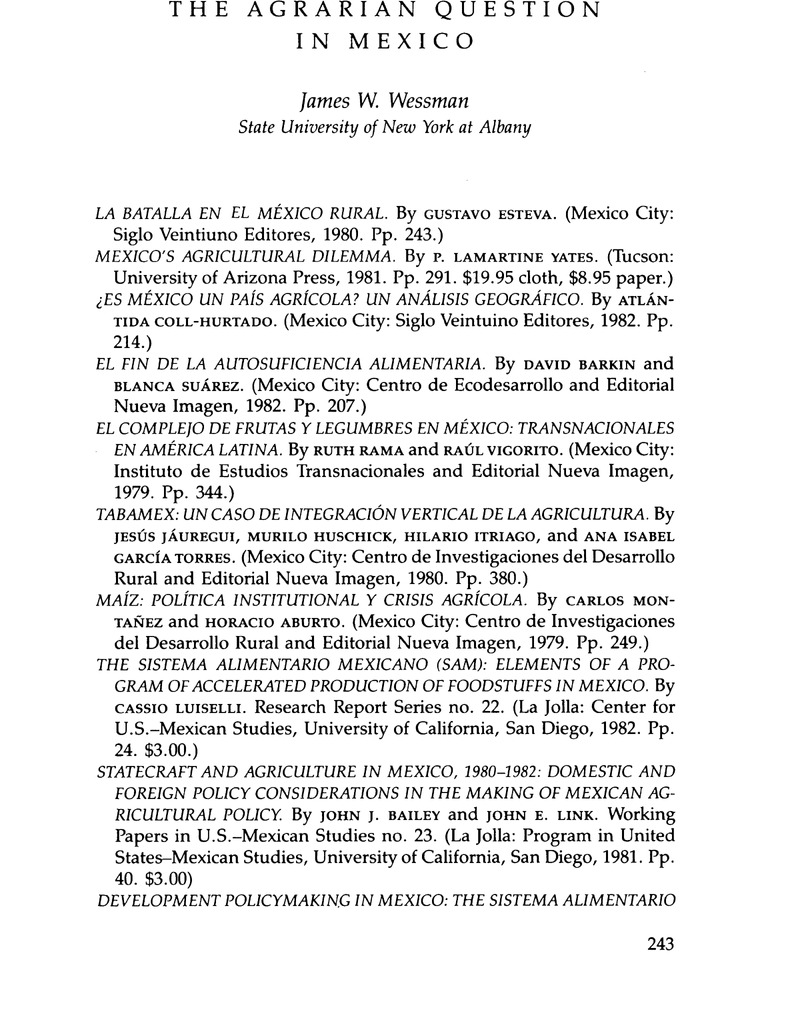Article contents
The Agrarian Question in Mexico
Review products
Published online by Cambridge University Press: 24 October 2022
Abstract

- Type
- Review Essays
- Information
- Copyright
- Copyright © 1984 by Latin American Research Review
References
Notes
1. Part of the discussion of Mexico's agrarian crisis, especially the role of SAM and the LFA, comes from my Peasants, Capitalists and the State: Mexico's Changing Agricultural Policies and the “Hungarian Project,” (Latin American Institute Research Paper No. 10, University of New Mexico, Albuquerque, 1982, mimeograph). A Spanish version was published as “Campesinos, capitalistas y el estado: la cambiante política agrícola mexicana y el ‘Proyecto Húngaro’,” Relaciones 12 (1982): 67–90.
2. Several important recent texts on the ejido that are not part of this review essay are El ejido mexicano by Romeo Rincón Serrano and El desarrollo agrario de México y su marco jurídico by José Luis Zaragoza and Ruth Macias, both published in Mexico City in 1980 by the Centro Nacional de Investigaciones Agrarias.
3. Arturo Warman, “Frente a la crisis, ¿política agraria o política agrícola?” Comercio Exterior 28, no. 6 (June 1978): 681–87.
4. An English version of this book has been published by J. F. Bergin, but I did not have the opportunity to consult the translation for purposes of this essay.
5. His book originally was published in Spanish in 1978 as El campo mexicano.
6. I maintain that we should evaluate North American writing about topics such as Mexico's agrarian question with a critical eye toward how well grounded these writings are in the national literature to which they pertain. Yates cites only technical reports and a few older “agrarian” writings and does not refer directly to more recent writers, such as those whose work is addressed in this essay.
7. The least satisfactory of her appendices is the third, which merely lists the headlines of newspaper articles about Mexican agriculture in the years 1978 to 1981. Intended to bring the analysis more up to date, this appendix merely underscores the necessity of waiting for a rigorous analysis of the 1980 censal reports.
8. This review essay might leave the impression that credit is not on the Mexican research agenda. Two recent books that focus on credit are: Jorge Echenique's Crédito y desarrollo agrícola en México (1940-1978) (Mexico City, 1981) and Thierry Linck's Usura rural en San Luis Potosí: un acercamiento a la problemática de la integración campesina (Zamora, 1982).
9. Julian Steward, Eric Wolf, Sidney Mintz et al., The People of Puerto Rico (Urbana, 1956).
10. The anthropological approach is amply demonstrated in the text and in the appendix, which presents the themes investigated in the other parts of the study.
11. Fernando Relio, “Política agrícola y lucha de clases,” Nueva Antropología 17 (May, 1981): 5.
12. Daniel Levy and Gabriel Székely, Mexico: Paradoxes of Stability and Change (Boulder, 1983).
13. For those interested in SAM and the LFA, the special number of Nueva Antropología (17, May 1981) dedicated to the “agricultural crisis and food strategy” is indispensable. In it one finds not only a statement of the objectives and the strategy of the Sistema Alimentario Mexicano (taken from a much longer report of limited circulation) and the text of the Ley de Fomento Agropecuario, but commentary by Gustavo Esteva, Fernando Relio, Raúl Olmedo, and others.
14. María Elena Montes de Oca, conversation with author in February of 1982, Albuquerque, New Mexico.
- 2
- Cited by




